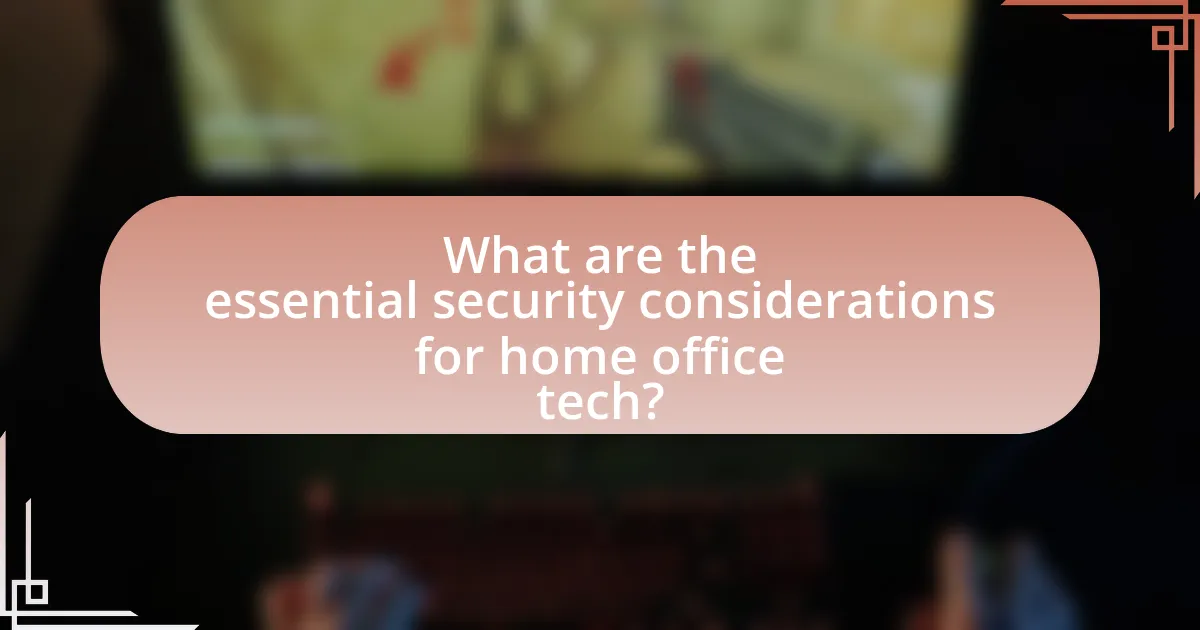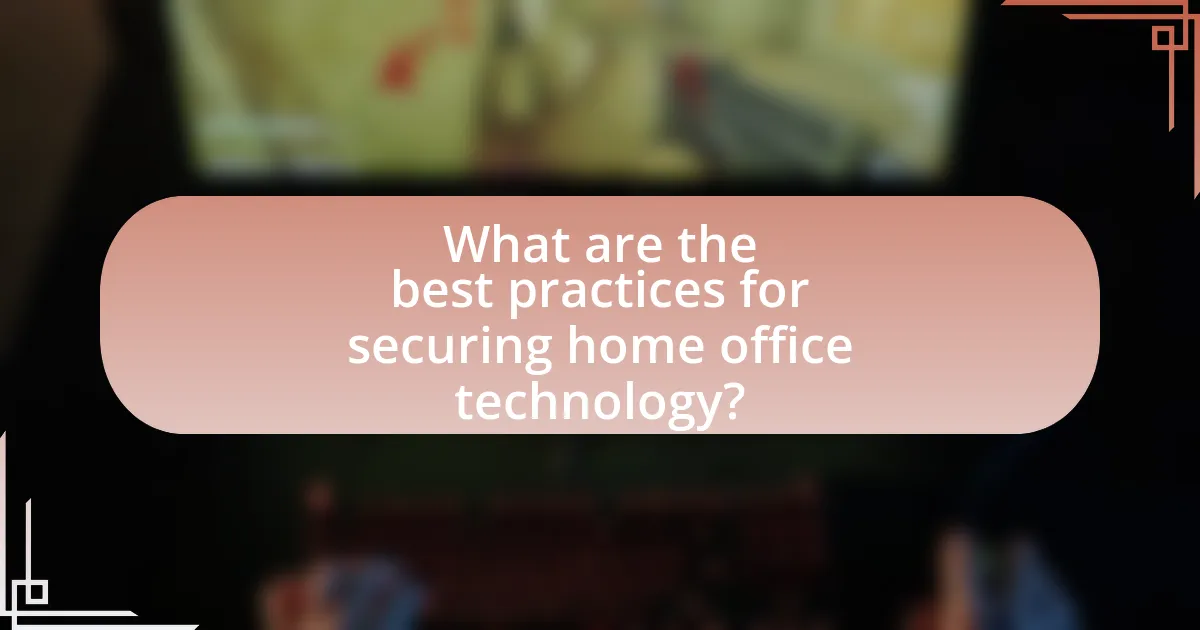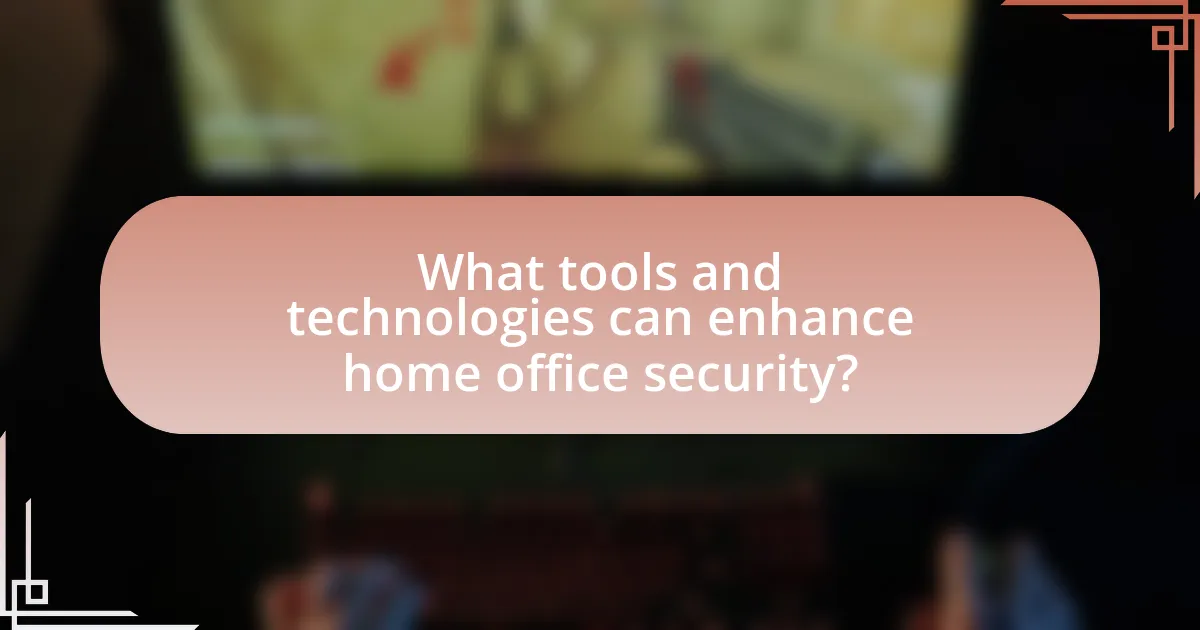The article focuses on essential security considerations for home office technology, emphasizing the importance of strong passwords, two-factor authentication, regular software updates, and network security. It outlines common vulnerabilities such as unsecured Wi-Fi networks and outdated software, while also addressing how personal habits can contribute to security risks. The significance of cybersecurity in remote work is highlighted, along with the potential consequences of security breaches. Best practices for securing home office technology, including the use of antivirus software and VPNs, are discussed, providing practical tips for enhancing both digital and physical security in a home office environment.

What are the essential security considerations for home office tech?
The essential security considerations for home office tech include using strong passwords, enabling two-factor authentication, keeping software updated, securing the home network, and using antivirus software. Strong passwords reduce the risk of unauthorized access, while two-factor authentication adds an extra layer of security. Regular software updates patch vulnerabilities that could be exploited by attackers. Securing the home network, such as changing default router passwords and using encryption, protects against intrusions. Finally, antivirus software helps detect and eliminate malware threats, ensuring a safer working environment.
How can you identify potential security risks in your home office setup?
To identify potential security risks in your home office setup, conduct a thorough assessment of your hardware, software, and network configurations. Start by checking for outdated software and operating systems, as 60% of breaches occur due to unpatched vulnerabilities. Next, evaluate your Wi-Fi security; ensure your network is secured with WPA3 encryption and a strong password, as unsecured networks can expose sensitive data. Additionally, review physical security measures, such as locking devices when not in use and securing your office space against unauthorized access. Regularly monitor for unusual activity on your accounts and devices, as early detection can prevent significant breaches.
What common vulnerabilities exist in home office technology?
Common vulnerabilities in home office technology include unsecured Wi-Fi networks, outdated software, and inadequate endpoint security. Unsecured Wi-Fi networks can be easily accessed by unauthorized users, leading to data breaches. According to a report by the Cybersecurity & Infrastructure Security Agency, nearly 80% of data breaches involve weak or stolen passwords, highlighting the importance of strong authentication measures. Outdated software often contains known vulnerabilities that can be exploited by attackers; for instance, the National Cyber Security Centre emphasizes the necessity of regular updates to mitigate risks. Additionally, inadequate endpoint security, such as the lack of antivirus software or firewalls, leaves devices susceptible to malware and cyberattacks, as noted by the Federal Trade Commission.
How do personal habits contribute to security risks?
Personal habits significantly contribute to security risks by creating vulnerabilities that can be exploited by cybercriminals. For instance, using weak or easily guessable passwords increases the likelihood of unauthorized access to sensitive information; studies show that 81% of data breaches are linked to weak passwords. Additionally, neglecting software updates can leave systems exposed to known vulnerabilities, as 60% of breaches involve unpatched software. Furthermore, sharing personal information on social media can facilitate social engineering attacks, with 70% of cybercriminals using this tactic to gather information. These habits collectively heighten the risk of security breaches in a home office environment.
Why is cybersecurity important for remote work?
Cybersecurity is crucial for remote work because it protects sensitive data from unauthorized access and cyber threats. With employees accessing company networks from various locations, the risk of data breaches increases significantly. According to a report by Cybersecurity Ventures, cybercrime is expected to cost the world $10.5 trillion annually by 2025, highlighting the urgent need for robust cybersecurity measures in remote work environments. Implementing strong security protocols, such as VPNs and multi-factor authentication, helps safeguard against these threats and ensures the integrity of company information.
What are the consequences of a security breach in a home office?
A security breach in a home office can lead to significant financial loss, data theft, and reputational damage. Financially, businesses may incur costs related to remediation, legal fees, and potential fines, with the average cost of a data breach estimated at $4.35 million according to IBM’s 2022 Cost of a Data Breach Report. Data theft can compromise sensitive information, including personal and financial data, which can be exploited for identity theft or fraud. Additionally, reputational damage can result in loss of customer trust and business opportunities, as 87% of consumers will not do business with a company after a data breach, as reported by the 2021 Cybersecurity Breaches Survey. These consequences highlight the critical importance of implementing robust security measures in a home office setting.
How does remote work increase exposure to cyber threats?
Remote work increases exposure to cyber threats primarily due to the reliance on personal devices and unsecured networks. Employees often use their home Wi-Fi, which may lack robust security measures, making it easier for cybercriminals to intercept data. Additionally, personal devices may not have the same level of security software or updates as corporate devices, increasing vulnerability to malware and phishing attacks. According to a report by Cybersecurity & Infrastructure Security Agency (CISA), remote work has led to a 400% increase in cybercrime, highlighting the significant risks associated with this work model.

What are the best practices for securing home office technology?
The best practices for securing home office technology include using strong, unique passwords, enabling two-factor authentication, regularly updating software, and utilizing a virtual private network (VPN). Strong, unique passwords reduce the risk of unauthorized access, while two-factor authentication adds an extra layer of security. Regular software updates patch vulnerabilities that could be exploited by attackers. A VPN encrypts internet traffic, protecting sensitive data from interception. According to a 2021 report by Cybersecurity & Infrastructure Security Agency, 85% of data breaches involve weak or stolen passwords, highlighting the importance of these practices.
How can you effectively secure your Wi-Fi network?
To effectively secure your Wi-Fi network, change the default SSID and password to a strong, unique combination. This action prevents unauthorized access, as many attackers exploit default settings. Additionally, enabling WPA3 encryption enhances security by providing stronger protection against brute-force attacks. According to the Wi-Fi Alliance, WPA3 offers improved security features compared to its predecessor, WPA2, making it a recommended choice for modern networks. Regularly updating your router’s firmware also addresses vulnerabilities, as manufacturers often release patches to fix security flaws. By implementing these measures, you significantly reduce the risk of unauthorized access to your network.
What steps should you take to change default router settings?
To change default router settings, access the router’s web interface by entering its IP address into a web browser. Typically, this IP address is 192.168.1.1 or 192.168.0.1. After entering the IP address, log in using the default username and password, which can usually be found on the router or in its manual. Once logged in, navigate to the settings menu to modify the default network name (SSID), password, and other security settings. It is crucial to save the changes and restart the router if necessary to apply the new settings. This process enhances network security by preventing unauthorized access.
How can you create a strong Wi-Fi password?
To create a strong Wi-Fi password, use a combination of at least 12 characters that includes uppercase letters, lowercase letters, numbers, and special symbols. This complexity makes it significantly harder for unauthorized users to guess or crack the password. Research indicates that passwords with a mix of character types are more secure; for instance, a study by the National Institute of Standards and Technology (NIST) emphasizes that longer passwords with diverse characters greatly enhance security. Additionally, avoid using easily guessable information such as birthdays or common words, as these can be quickly compromised through social engineering tactics.
What role do software updates play in security?
Software updates play a critical role in security by patching vulnerabilities that could be exploited by attackers. Regular updates ensure that software remains protected against newly discovered threats, as they often include fixes for security flaws identified since the last version. For instance, a report from the Cybersecurity & Infrastructure Security Agency (CISA) highlights that unpatched software is a common vector for cyberattacks, emphasizing the importance of timely updates to mitigate risks.
How often should you update your operating system and applications?
You should update your operating system and applications at least once a month. Regular updates are crucial for maintaining security, as they often include patches for vulnerabilities that could be exploited by malware or hackers. According to the Cybersecurity & Infrastructure Security Agency (CISA), timely updates can significantly reduce the risk of cyber threats, as many attacks target known vulnerabilities that have already been addressed in updates. Therefore, adhering to a monthly update schedule is a best practice for ensuring the security of your home office technology.
What are the risks of ignoring software updates?
Ignoring software updates poses significant risks, including increased vulnerability to security breaches and malware attacks. Software updates often contain patches that fix known security flaws; without these updates, systems remain exposed to exploitation. For instance, the 2017 Equifax data breach, which compromised the personal information of 147 million people, was largely attributed to the failure to apply a critical software update. Additionally, outdated software can lead to compatibility issues, decreased performance, and loss of access to new features, ultimately impacting productivity and user experience.

What tools and technologies can enhance home office security?
To enhance home office security, tools and technologies such as security cameras, smart locks, firewalls, and VPNs are essential. Security cameras provide real-time monitoring and can deter unauthorized access, while smart locks offer keyless entry and remote access control, increasing convenience and security. Firewalls protect against cyber threats by monitoring incoming and outgoing network traffic, and VPNs encrypt internet connections, safeguarding sensitive data from potential breaches. These technologies collectively create a robust security framework for home offices, ensuring both physical and digital safety.
How can antivirus software protect your home office?
Antivirus software protects your home office by detecting, preventing, and removing malicious software that can compromise your devices and data. It actively scans files and applications for known threats, blocking harmful downloads and preventing unauthorized access to sensitive information. According to a report by Cybersecurity Ventures, cybercrime is projected to cost the world $10.5 trillion annually by 2025, highlighting the critical need for robust antivirus solutions. By employing real-time protection and regular updates, antivirus software ensures that your home office remains secure against evolving threats, safeguarding both personal and professional data.
What features should you look for in antivirus software?
When selecting antivirus software, look for features such as real-time protection, malware detection, firewall capabilities, and regular updates. Real-time protection actively scans files and applications as they are accessed, preventing threats before they can cause harm. Effective malware detection should include various scanning options, such as quick, full, and custom scans, to identify and eliminate different types of malware. A robust firewall adds an additional layer of security by monitoring incoming and outgoing network traffic, blocking unauthorized access. Regular updates ensure that the antivirus software can defend against the latest threats, as cyber threats evolve rapidly. These features collectively enhance the overall security of your home office environment.
How can you ensure your antivirus software is effective?
To ensure your antivirus software is effective, regularly update it to protect against the latest threats. Antivirus software relies on up-to-date virus definitions and security patches to identify and neutralize new malware. According to a report by AV-Test, outdated antivirus solutions can miss up to 30% of new malware variants, highlighting the importance of maintaining current software. Additionally, running regular system scans and enabling real-time protection features further enhances the software’s effectiveness in detecting and removing threats.
What is the importance of using a VPN for remote work?
Using a VPN for remote work is crucial for ensuring data security and privacy. A VPN encrypts internet traffic, protecting sensitive information from potential cyber threats, such as hacking and data breaches. According to a report by Cybersecurity Ventures, cybercrime is projected to cost the world $10.5 trillion annually by 2025, highlighting the increasing risks associated with remote work. Additionally, a VPN allows employees to access company resources securely, maintaining compliance with data protection regulations. This combination of encryption and secure access underscores the importance of VPNs in safeguarding remote work environments.
How does a VPN enhance your online privacy?
A VPN enhances your online privacy by encrypting your internet connection and masking your IP address. This encryption prevents third parties, such as hackers and ISPs, from intercepting your data and monitoring your online activities. Additionally, by routing your internet traffic through a secure server, a VPN makes it difficult for websites and advertisers to track your browsing habits. According to a study by the Electronic Frontier Foundation, using a VPN can significantly reduce the risk of data exposure, especially on public Wi-Fi networks, where security vulnerabilities are prevalent.
What should you consider when choosing a VPN service?
When choosing a VPN service, you should consider factors such as security features, privacy policies, speed, server locations, and customer support. Security features like encryption protocols (e.g., OpenVPN, IKEv2) ensure your data is protected, while a strict no-logs policy guarantees your online activities remain private. Speed is crucial for seamless browsing and streaming, and a wide range of server locations allows for better access to geo-restricted content. Additionally, reliable customer support can assist with any issues that arise during use. These considerations are essential for ensuring a secure and efficient VPN experience.
What are the best practices for managing passwords?
The best practices for managing passwords include using strong, unique passwords for each account, enabling two-factor authentication, and regularly updating passwords. Strong passwords should consist of at least 12 characters, combining uppercase and lowercase letters, numbers, and special symbols, which significantly reduces the risk of unauthorized access. Two-factor authentication adds an extra layer of security by requiring a second form of verification, such as a text message or authentication app, making it harder for attackers to gain access even if they have the password. Regularly updating passwords, ideally every three to six months, helps mitigate the risk of compromised credentials. According to a 2021 study by the Cybersecurity & Infrastructure Security Agency, 81% of data breaches are linked to weak or stolen passwords, underscoring the importance of these practices in safeguarding personal and professional information.
How can password managers improve your security?
Password managers improve your security by securely storing and encrypting your passwords, making it easier to use complex, unique passwords for each account. This reduces the risk of password reuse, which is a common vulnerability exploited by cybercriminals. According to a study by the Cybersecurity & Infrastructure Security Agency, 81% of data breaches are caused by weak or stolen passwords. By utilizing a password manager, users can generate strong passwords and automatically fill them in, minimizing the chances of phishing attacks and unauthorized access.
What strategies can you use to create strong passwords?
To create strong passwords, use a combination of upper and lower case letters, numbers, and special characters, aiming for at least 12 characters in length. This strategy enhances security by increasing the complexity of the password, making it harder for attackers to guess or crack. Research indicates that passwords with a mix of character types are significantly more resistant to brute-force attacks, which can attempt millions of combinations per second. Additionally, avoid using easily guessable information such as birthdays or common words, as these can be quickly compromised. Implementing these strategies can greatly reduce the risk of unauthorized access to sensitive information.
What practical tips can you implement for better home office security?
To enhance home office security, implement strong passwords and two-factor authentication for all accounts. Strong passwords, consisting of at least 12 characters with a mix of letters, numbers, and symbols, significantly reduce the risk of unauthorized access; a study by the National Institute of Standards and Technology indicates that complex passwords can prevent 80% of hacking attempts. Additionally, regularly update software and operating systems to patch vulnerabilities, as outdated software is a common entry point for cybercriminals. Use a virtual private network (VPN) to encrypt internet traffic, which protects sensitive data from interception, especially on public Wi-Fi networks. Finally, secure physical access to your workspace by locking doors and using security cameras, as physical security measures can deter intruders and protect equipment and confidential information.
How can you educate yourself and your family about cybersecurity?
To educate yourself and your family about cybersecurity, engage in regular training sessions that cover essential topics such as password management, phishing awareness, and safe browsing practices. Research indicates that organizations that conduct cybersecurity training see a 70% reduction in successful phishing attacks (CybSafe, 2020). Utilize online resources, such as the Cybersecurity & Infrastructure Security Agency (CISA) website, which offers free materials and guidelines tailored for families. Additionally, encourage discussions about cybersecurity threats and best practices during family meetings to reinforce learning and awareness.
What routine checks should you perform to maintain security?
To maintain security, perform routine checks on software updates, firewall settings, and password management. Regularly updating software ensures that vulnerabilities are patched, as outdated software can be an entry point for cyber threats. Checking firewall settings confirms that unauthorized access is blocked, providing an essential layer of protection. Additionally, managing passwords by using strong, unique passwords and enabling two-factor authentication significantly reduces the risk of unauthorized access to sensitive information. These practices are supported by cybersecurity guidelines from organizations like the National Institute of Standards and Technology, which emphasize the importance of regular updates and strong authentication measures in maintaining security.

